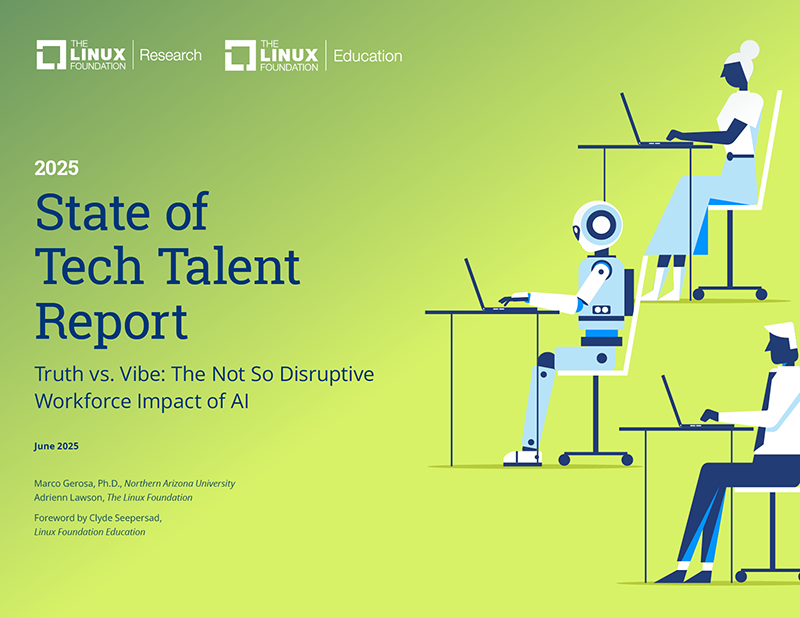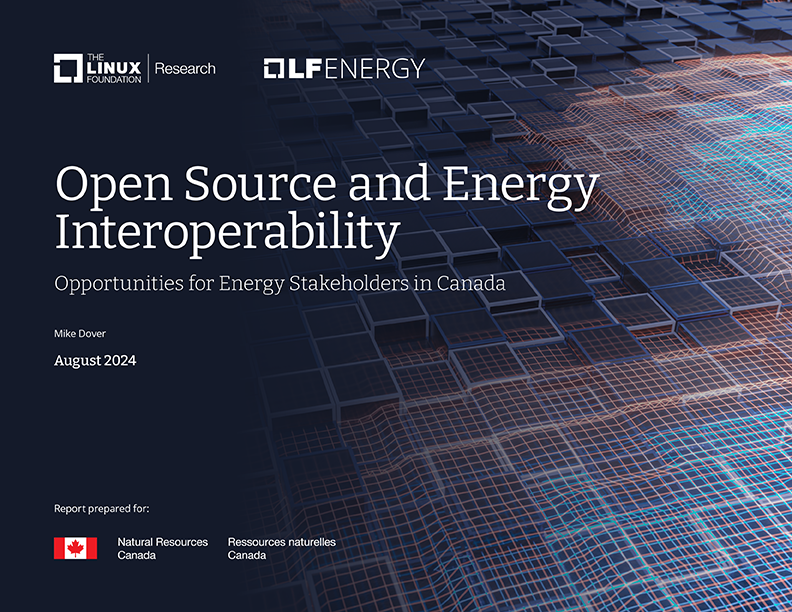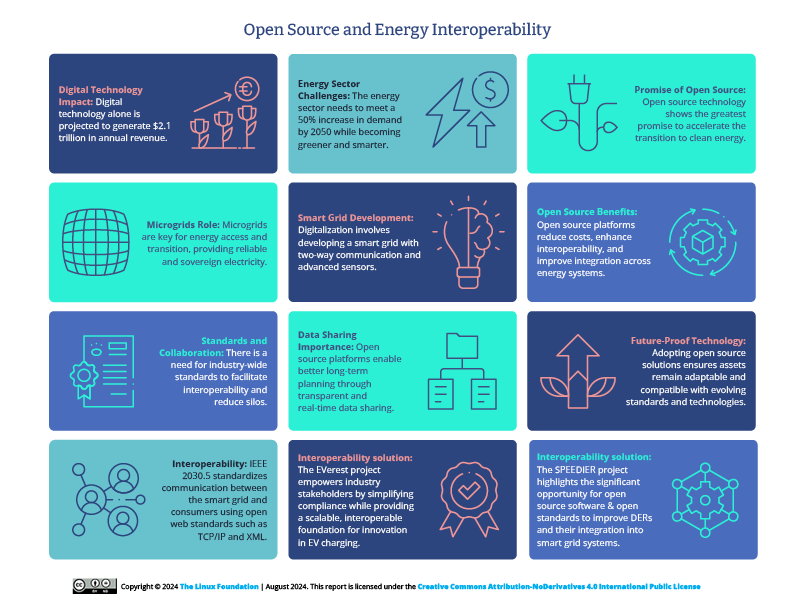LINUX FOUNDATION RESEARCH
We’re investigating the impact of open source collaboration to solve the world’s most pressing challenges.

About LF Research
2025 State of Tech Talent Report
In the 2025 State of Tech Talent Report, LF Research and LF Education dug into trends and challenges in key technical areas this year, including AI. The report is based on findings from a survey distributed to hiring and training managers across the LF community

Participate in Our Research
Join the LF Research Forum and participate in our surveys and interviews to give back to your community and earn events & training discounts!

Interested in conducting research?
Review our prospectus for more information, and email us at research@linuxfoundation.org

Open Source and Energy Interoperability
Download ReportThe energy sector faces immense pressure to increase its supply while at the same time becoming greener and smarter. As discussed in our 2023 Energy Transformation Readiness Study, open source software (OSS) can help speed up this transition in a number of ways, in particular by enabling the integration of distributed energy sources. How does OSS solve the issue of interoperability amongst these different energy sources?
In a study prepared for Natural Resources Canada, LF Research investigated this research question in the context of the Canadian energy grid. From interviews with 17 experts working in energy grid modernization, this report explains the main reasons for harmonizing the grid, distills the key blockers of interoperability — communication, data sharing, privacy and security — and describes how the adoption of standards can be improved in order to overcome these obstacles. It also provides some case studies where open source adoption has led to more sustainable, effective, and interoperable energy utility projects.
Author:
- Mike Dover
Additional Resources:
DOI: 10.70828/VLFN5091
Our Team
Filter by:
Hilary Carter
SVP, Research
Hilary Carter joined the Linux Foundation in 2021 to launch and lead LF Research, established to deliver empirical insights into open source trends, opportunities, and challenges. Prior to joining the Linux Foundation, Hilary led a global, syndicated research institute focused on blockchain technology based in Toronto, Canada. She has authored and led nearly 200 research projects focused on open source innovation and its adoption across industries. Hilary holds a Master of Science in Management from the London School of Economics, and holds dual Irish and Canadian citizenship.
Adrienn Lawson
Director of Quantitative Research
Adrienn serves as Director of Quantitative Research at the Linux Foundation, where she leads data-driven initiatives to understand open source ecosystems. With expertise in social data science from the University of Oxford and a background spanning academic and governmental research, she brings methodological rigor to analyzing distributed collaboration networks.
At the Linux Foundation, Adrienn leads a team conducting cross-sectional research across industry verticals and geographic regions to provide comprehensive insights into open source dynamics. Her work encompasses empirical investigations into regulatory compliance, the implications of AI, and sustainable funding models. She produces evidence-based recommendations that inform strategic decision-making within the open source community.
Anna Hermansen
Senior Researcher & Ecosystem Manager
Anna is the Ecosystem Manager for LF Research where she supports end-to-end management of the Linux Foundation's research projects. She has conducted qualitative and systematic review research in health data infrastructure and the integration of new technologies to better support data sharing in healthcare. She is a generalist with experience in client services, program delivery, project management, and writing for academic, corporate, and web user audiences. Prior to the Linux Foundation, she worked for two different research programs, the Blockchain Research Institute and BC Cancer's Research Institute.

Marco Gerosa
Data Analyst
Dr. Marco Aurélio Gerosa is a Full Professor of Computer Science at Northern Arizona University (NAU), USA. His recent research includes exploring AI and chatbots to support open source communities. He earned his Ph.D. in Computer Science from the Pontifical Catholic University of Rio de Janeiro (PUC-Rio) and has published over 300 peer-reviewed papers. He has expertise in quantitative and qualitative research methods and mining software techniques.

Sam Boysel
Data Scientist
Sam Boysel is a Data Scientist at the Linux Foundation. He has extensive empirical research experience across many topics in the open source ecosystem. His work leverages microeconomic theory to explore incentives, behaviors, and place value on open source dynamics. Before joining the Linux Foundation, Sam was a postdoctoral researcher with the Laboratory for Innovation Science at Harvard. He holds a B.A., M.S., and Ph.D. in Economics.

Lucian Balea
RTE
Lucian is Open Source Program Director at RTE, the French power transmission system operator. He is leading the open source strategy of RTE which aims at moving the digitalization of the power grid into a new era. Early 2018, he started a collaboration with The Linux Foundation to launch LF Energy, an open source coalition to speed technological innovation and support the energy transition across the world. Today, Lucian is deeply involved in LF Energy and serves as Chair of the Governing Board.
Lucian has been with RTE since 2003 where he held several management positions in the fields of R&D, markets and finance.

Bianca Trinkenreich
Data Analyst
Dr. Bianca Trinkenreich is an Assistant Professor of Computer Science at Colorado State University (CSU), USA. Her recent research includes exploring human-centric AI, software teams' culture, developer experience and technostress. She earned her Ph.D. in Computer Science from Northern Arizona University and has published over 50 peer-reviewed papers. She has expertise in mixed-methods studies involving both quantitative and qualitative research methods and mining software techniques.

Frank Nagle
Advising Chief Economist
Frank Nagle is an assistant professor in the Strategy Unit at Harvard Business School and the Advising Chief Economist at the Linux Foundation. Professor Nagle studies how competitors can collaborate on the creation of core technologies, while still competing on the products and services built on top of them – especially in the context of artificial intelligence. His research falls into the broader categories of the future of work, the economics of IT, and digital transformation and considers how technology is weakening firm boundaries. His work utilizes large datasets derived from online social networks, open source software repositories, financial market information, and surveys of enterprise IT usage.
Professor Nagle’s work has been published in top academic journals as well as in practitioner-oriented publications like Harvard Business Review, MIT Sloan Management Review, and Brookings Institution TechStream. He has won awards and grants from AOM, NBER, SMS, INFORMS, EURAM, GitHub, the Sloan Foundation, and the Linux Foundation. He is a faculty affiliate of the Digital, Data and Design (D^3) Institute at Harvard, the Managing the Future of Work Project, and the Laboratory for Innovation Science at Harvard (LISH).

Henry Chesbrough
UC Berkeley
Henry Chesbrough is best known as “the father of Open Innovation”. He teaches at the Haas School of Business at the University of California-Berkeley, where he is the Faculty Director of the Garwood Center for Corporate Innovation. He is also Maire Tecnimont Professor of Open Innovation and Sustainability at Luiss University in Rome. Previously he was an Assistant Professor at Harvard Business School. He holds a PhD from UC Berkeley, and MBA from Stanford, and a BA from Yale University. He has written books such as Open Innovation (Harvard Business School Press, 2003), Open Business Models (Harvard Business School Press, 2006), Open Services Innovation (Jossey-Bass, 2011) and Open Innovation Results (Oxford, 2020). His research has been cited more than 90,000 times, according to Google Scholar. He has been recognized as one of the leading business thinkers by Thinkers50. He received an Innovation Luminary award from the European Commission in 2014. He received the Industrial Research Institute Medal of Achievement in 2017, and has two honorary doctorates.

Jerry Cuomo
Fellow, IBM
Jerry is a retired IBM Fellow with more than 38 years' experience as a software innovator and open-source advocate. He currently lectures at North Carolina State University and leads Wild Ducks, LLC, where he consults, develops, and secures intellectual property in trustworthy AI, blockchain, and cybersecurity.
He holds more than 100 U.S. patents. Among his most notable is the "Someone is typing…" indicator, now used billions of times daily in instant messaging.
Jerry is the author of the Think series, which includes Think Blockchain and Think Artificial Intelligence as well as co-author of Blockchain for Business and The Art of Automation.

Peixin Hou
Huawei
Peixin Hou is currently serving as the Chief Architect of Open Software and Systems in the Central Software Institute, Huawei. He has been working in the software industry for over 20 years and has experience in operating systems, mobile software, media processing, and cloud computing.
Peixin started his open source journey in 2000 and is now an active strategist and evangelist in the field. He is involved in defining various key strategies on open source for Huawei and leads the company’s FOSS development in areas such as Linux and containers. He also serves as a board or steering committee member in several open source projects, such as Cloud Native Computing Foundation and Core Infrastructure Initiative. Peixin has also represented Huawei on the board of Linaro.
Peixin received his Ph.D. from the University of Surrey, UK in electronic and electrical engineering.

Rao Lakkakula
Microsoft
Rao Lakkakula leads the open-source ecosystem team at Microsoft. In the past, he led security and engineering teams at JPMorgan Chase, Amazon, and Climate Technologies. Rao is passionate about open-source security and is a key member of the initial team that started Open-Source Security Foundation (OpenSSF).

Jessica Marz
Intel
Jessica Marz leads Intel’s Open Source Program Office. As experts in explaining legal concepts to software developers and software development concepts to lawyers, she and her team are responsible for defining and managing Intel’s open source software consumption and production policies. Personally and professionally, she eats, breathes, and sleeps all things “open” and DIY. She has spoken at open source events such as the FSFE Legal & Licensing Workshop, FOSDEM, Copyleft Conference, FOSS North, and various Linux Foundation conferences. Jessica holds a JD from Santa Clara University School of Law, an MBA from San Jose State University, and a BA in English from UCLA.

Jessica Murillo
IBM
Jessica Murillo is Vice President, Open Systems Development at IBM. She leads a broad set of software development teams, including the IBM Linux Technology Center, collaborative software development, virtualization, containers, cloud computing, and next generation workload solutions across IBM’s POWER and IBM Z servers. The Open Systems Development organization is a worldwide team that is distributed across Australia, Brazil, China, France, Germany, India, and the United States.

Sachiko Muto
OFE/RISE
Sachiko Muto is the Chair of OpenForum Europe and a senior researcher at RISE Research Institutes of Sweden. She originally joined OFE in 2007 and served for several years as Director with responsibility for government relations and then as CEO. She has degrees in Political Science from the University of Toronto and the London School of Economics and has been a guest researcher at UC Berkeley and TU Delft.

Frank Nagle
Advising Chief Economist
Frank Nagle is a Research Scientist at the Initiative on the Digital Economy at the Massachusetts Institute of Technology (MIT) and the Chief Economist at The Linux Foundation. Dr. Nagle studies how competitors can collaborate on the creation of core technologies, while still competing on the products and services built on top of them - especially in the context of artificial intelligence, open source software, and cyber security. Dr. Nagle’s work has been published in numerous academic journals and practitioner-oriented publications and he has won awards and grants from academic and non-profit organizations. He advises multiple startups, has worked with research groups at the OECD and European Commission and has consulted for The World Bank, the U.S. Treasury Department, the Social Security Administration, and various companies in the technology, defense, and energy sectors. Prior to his academic career, Frank worked at a number of startups and large companies in the information security and technology consulting industries. Before MIT, Frank was a professor at Harvard Business School and the Marshall School of Business at the University of Southern California. Frank earned his DBA in Technology and Operations Management from Harvard Business School. He also earned a BS and MS in Computer Science from Georgetown University and an MS in International Business Economics from City University, London.

Daniel Park
Samsung
Dr. Daniel Park is a head of open source group in Samsung where he is responsible for open source strategy, corporate governance and compliance operation, project development and developer relationship and all kinds of open source stuffs. He has many experiences in terms of global standard and collaboration including W3C advisory board and working group chair, IETF working group chair, OCF vice president and open source work group chair, and currently his experience is being expanded to open source communities. He received his Ph.D from Kyung Hee University in Computer Engineering.

Phil Robb
Ericsson
Phil is the Head of Ericsson Software Technology (EST), where he leads a passionate group of engineers developing open source software across a wide range of projects including Linux, OpenStack, Kubernetes, and ONAP among many others.
Prior to Ericsson, Phil was the V.P. of Operations for the Networking Projects at the Linux Foundation including ORAN, ONAP, OpenDaylight, and Anuket. In that role, Phil led a team of technical staff who oversaw community software development based on DevOps and open source best practices. Prior to the Linux Foundation, Phil spent 12 years with Hewlett Packard working on Linux and Open Source starting in 2001. There, Phil formed and led HP’s Open Source Program Office responsible for open source strategy, tools, processes, and investments as HP transitioned from Unix to Linux in the Enterprise Server market.

Maria Roche
Harvard Business School
Maria Roche is an Assistant Professor of Business Administration in the Strategy Unit at Harvard Business School. She teaches Strategy in the MBA required curriculum. Her research focuses on the sourcing, production and diffusion of knowledge, which she examines in various contexts including cities, co-working spaces, universities, and open source platforms. Her work, published at The Review of Economics and Statistics, Organization Science and Research Policy, has been featured, a.o., in The Atlantic, Handelsblatt and the WSJ.
Professor Roche earned her PhD in Management (Strategy and Innovation) at the Scheller College of Business, Georgia Institute of Technology, where she was a recipient of a NSF Science of Science and Innovation Policy Doctoral Dissertation Research Improvement Grant. She earned an MS in Business Administration and a BA in International Cultural and Business Studies at the University of Passau, Germany.

Nithya Ruff
LF Board Chair
Nithya A. Ruff is the Head of the Amazon Open Source Program Office. She drives open source culture and coordination inside of Amazon and engagement with external communities. Open Source has proven to be one of the world’s most prolific enabler of innovation and collaboration, and Amazon’s customers increasingly value open source innovation and the cloud’s role in helping them adopt and run important open source services. Prior to Amazon, she started and grew Comcast and Western Digital’s Open Source Program Offices. Open Source Program Offices are a critical part of a company’s digital transformation and innovation journey and enable the intentional and systematic engagement with open source for companies.
Nithya has been director-at-large on the Linux Foundation Board for the last 5 years and in 2019 was elected to be Chair of the influential Linux Foundation Board. She works actively to advance the mission of the Linux Foundation around building sustainable ecosystems that are built on open collaboration.

Keiichi Seki
NEC
Keiichi Seki is a leading member of the open source program office in NEC Corporation, and is responsible for NEC’s open source strategy. He leads NEC’s developer teams who are actively contributing to open source communities, such as Kubernetes and OpenStack. He also helps encourage people in the NEC group of companies to join and contribute to open source communities. He handles intellectual property issues regarding open source software patents, and has been a technical committee member of the Open Invention Network since 2019.

Mark Shan
Tencent
Mark Shan has a long career and practical experience in cloud-native, microservices, big data, edge computing, and open-source ecosystem. As the chairperson of Tencent Open Source Alliance, he works full of passion to build the ecosystem for Tencent Open Source and makes great efforts to accelerate innovation in technology and product with the open-source way.
At Tencent Cloud, Mark leads the open-source team and works with organizations and communities including Apache Software Foundation, Linux Foundation, Open Atom Foundation, CAICT, COPU and others to build open-source ecosystem. He is also the observer of Linux Foundation Board, chairperson of TARS Foundation, TOC member of Open Atom Foundation and Magnolia Open Source Community, TSC member of Akraino Edge Stack, fellow of China Cloud Native Industry Alliance, advisor of Open Source Community, member of CCF Open Source Committee.

Rick Stevens
Argonne National Laboratory
Rick Stevens is a Professor of Computer Science at the University of Chicago and the Associate Laboratory Director of the Computing, Environment and Life Sciences (CELS) Directorate and Argonne Distinguished Fellow at Argonne National Laboratory. His research spans the computational and computer sciences from high-performance computing architecture to the development of tools and methods for bioinformatics, cancer, infectious disease, and other challenges in science and engineering. Recently, he has focused on developing AI methods for a variety of scientific and biomedical problems, and also has significant responsibility in delivering on the U.S. national initiative for Exascale computing and developing the DOE’s Frontiers in Artificial Intelligence for Science, Security, and Technology (FASST) national initiative.
Stevens is a member of the American Association for the Advancement of Science and has received many national honors for his research, including being named a Fellow of the Association of Computer Machinery (ACM) for his continuing contributions to high-performance computing.

Irving Wladawsky-Berger
MIT
Dr. Irving Wladawsky-Berger is Visiting Lecturer at MIT’s Sloan School of Management, a Fellow of MIT’s Initiative on the Digital Economy and of MIT Connection Science.
He retired from IBM in May of 2007 after a 37 year career with the company, where his primary focus was on innovation and technical strategy. He’s been an Adviser on Digital Strategy at Citigroup, at HBO, and at MasterCard. He’s been writing a weekly blog,irvingwb.com, since 2005, and was a guest columnist at the Wall Street Journal CIOJournal.
Dr. Wladawsky-Berger received an M.S. and a Ph. D. in physics from the University of Chicago.

Chris Xie
Futurewei
Chris Xie serves as the Head of Open Source Strategy at Futurewei, where he leads various strategic open source initiatives. His involvement in diverse open source communities has established him as a knowledgeable and strategic thought leader. Chris plays an active role in several key projects and committees, contributing to organizations like LF Research, LF Energy, Green Software Foundation, OpenSSF, and the Todo Group (OSPO). Earlier in his career, Chris started a software startup company as a Silicon Valley entrepreneur , focusing on decentralized computing. Chris holds patents in network management and distributed systems, reflecting his strong technical expertise. Recognized for his cross-cultural leadership, he has been featured in the San Francisco Chronicle Business News.

Mike Dolan
Senior Vice President and GM of Projects
Michael Dolan is SVP and GM of Projects supporting open source projects, research, and legal programs at The Linux Foundation. He has set up and launched hundreds of open source and open standards projects covering technology segments including networking, cloud, blockchain, Internet of Things, AI/ML, security, storage, and embedded devices. Mike also runs open source legal programs for the Linux Foundation’s members’ legal counsel community which has led to collaborations on standards such as OpenChain and SPDX.
Prior to joining The Linux Foundation, he spent eight years at IBM in roles across systems, services, and software. He received an M.B.A. from Case Western Reserve University, a J.D. from Cleveland State University, and a B.S. in economics from John Carroll University. Mike is a member of the Ohio State Bar Association.

Jim Zemlin
Executive Director
Jim Zemlin’s career spans three of the largest technology trends to rise over the last decade: mobile computing, cloud computing, and open source software. Today, as executive director of The Linux Foundation, he uses this experience to accelerate innovation in technology through the use of open source and Linux.
At The Linux Foundation, Jim works with the world’s largest technology companies, including IBM, Intel, Google, Samsung, Qualcomm, and others to help define the future of computing on the server, in the cloud, and on a variety of mobile computing devices. His work at the vendor-neutral Linux Foundation gives him a unique and aggregate perspective on the global technology industry.
Jim has been recognized for his insights on the changing economics of the technology industry, and he is a regular keynote speaker at industry events. He advises a variety of startups, including Splashtop, and sits on the boards of the Global Economic Symposium, Open Source For America, and Chinese Open Source Promotion Union.

Stephen Walli
Microsoft
Stephen Walli is a principal program manager at Microsoft in the Azure Office of the CTO. Stephen has been a Distinguished Technologist at Hewlett-Packard, technical director at the Outercurve Foundation, founded a start-up, and been a writer and consultant. He's been around open source software for 30+ years. He is governing board chair for the Confidential Computing Consortium, Microsoft board member to the Eclipse Foundation, and an IEEE standards working group chair. Stephen is adjunct faculty at Johns Hopkins University.
Latest Research from the Open Source Community
- AI Openness Update Report (OpenUK)
- Kubernetes and the UK Report (OpenUK)
- AI Action Summit (OpenUK)
- The Evolving State of Supply Chain Security (DarkReading / Synopsys, July 2024)
- State of Open: The UK in 2024 Phase 2: "The Open Manifesto" (OpenUK)
- Open Source Software: The $9 Trillion Resource Companies Take for Granted (Harvard Business School)
- State of Open: The UK in 2024 (OpenUK)
- 2024 State of Open Source Report (OpenLogic, Open Source Initiative, and Eclipse Foundation)
- 2024 Open Source Security and Risk Analysis Report (Synopsis)
- State of Open Source Security 2023 (Snyk)
- State of the Software Supply Chain (Sonatype)




